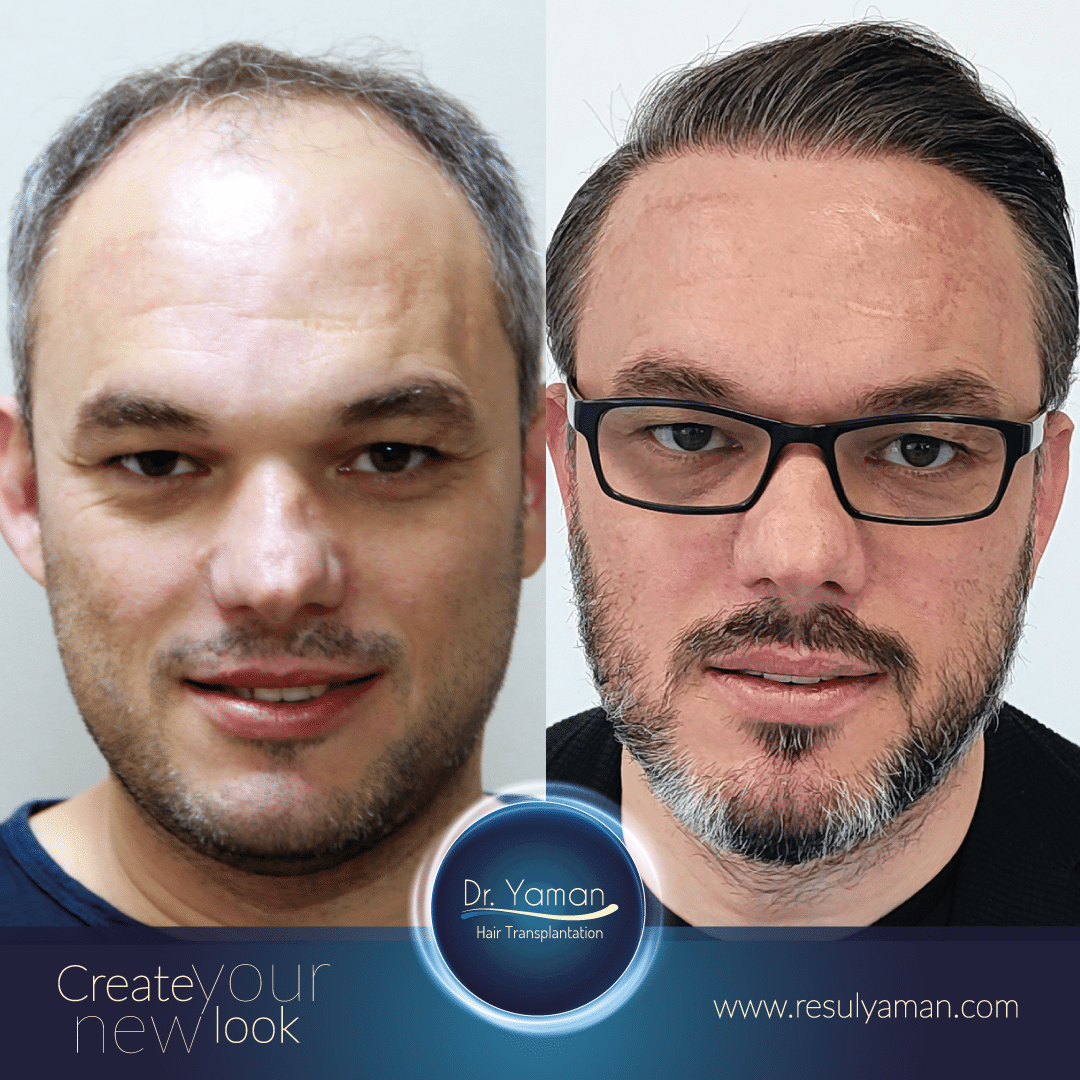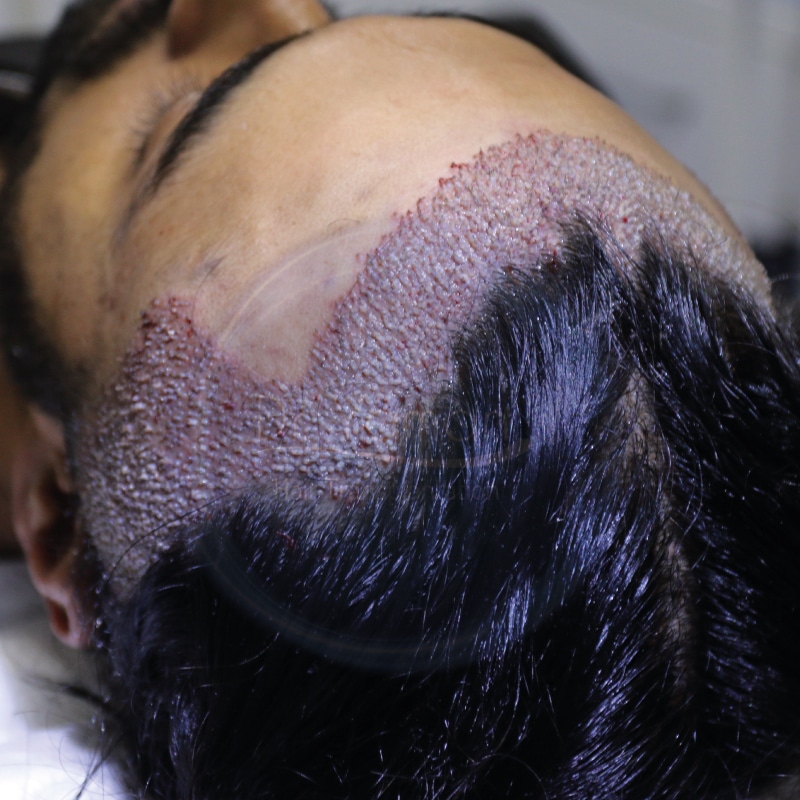
Undergoing your hair transplant operation is only half of your hair restoration journey. After the surgery, your scalp will undergo many changes, during which you may feel discomfort or even pain. While this is totally normal, it’s essential that you stay on track and follow the guidance of Dr. Resul Yaman so you can get the best results possible. Let’s take a look at the first side effect you will most likely experience, which is post-operational swelling and also see the hair transplant before and after too which will be the final result after several months.
Post Operational Swelling
Although hair transplant surgeries are quite mild compared to other types of surgeries, they also come with their fair share of side effects. One side effect we want to talk about in particular is post-operational swelling. It is completely harmless and will start to come around day three after your surgery. On average, day seven is when your swelling will be at its peak.
In some cases, you may only experience swelling in your scalp, but in other cases, it’s not uncommon for your forehead or the area around your eyes to start swelling too. To avoid these side effects, it’s best if you keep your head elevated and avoid lying face down.
Also Read: Washing Hair After a Transplant: Do’s and Dont’s
One to Two Months After Your Hair Transplantation Surgery
During the first and second months after your hair transplantation in Turkey, your scalp will undergo many changes. This is all completely normal, as it indicates that your scalp is starting to heal up.
During the first month, you will likely shed much of your transplanted hair. This phase is known as “Shock Loss” and is completely normal. The shock loss phase can last for up to three months, but it will eventually subside.
During your second month, you may start to see some of your new hair growing out. Do note that it’s common for your newly implanted hair to grow unevenly, so don’t get stressed if that happens. It’s completely normal.
Three to Six Months After Your Hair Transplantation Surgery
Between months three and six, you will start to see noticeable changes in your hair. It will look much fuller, but it may still grow quite unevenly. During this time, you should pay attention to your scalp and be careful about getting blisters and infections. If you notice any unusual changes to your scalp, please consult with Dr. Yaman immediately. As you near month six after your hair transplant surgery, your hair will start to grow stronger and thicker. You can start combing your hair but make sure you don’t expose it to too cold or too hot temperatures.
Read More: The Day of the Hair Transplant – How to Prepare Effectively
1 Year After Your Hair Transplantation Surgery
After a whole year since your hair transplant surgery, you will be able to see your desired results. Your donor and recipient areas will be completely healed, and you can now style your hair using whatever products you want. After a year, you don’t need to worry about scratching your scalp, wearing a hat, or going in the sea. You can fully return back to your normal life, except this time, you’ll have the hair of your dreams and you will finally see that cost of hair transplant in Turkey was actually an investment!
Things to Consider During Your Recovery
Your hair transplant journey is far from over once you undergo the surgery. Once you come out of Dr. Resul Yaman’s Hair Clinic, you need to take proper care of your newly implanted hair follicles to give them the best chance to succeed. Here are a few things Dr. Yaman wants you to consider during your recovery.
- Don’t wash your hair for the first 48-72 hours. After two weeks, you can wash your hair according to your normal routine.
- Don’t use a hair dryer to dry your hair for the first six months after your surgery.
- You can comb the donor area from day one, but you shouldn’t comb the recipient area for the first two weeks as that can result in your dislodging the hair follicles.
- If you want to cut your hair before the three months are up since your surgery, please only use scissors.
- Avoid dying your hair for the first two months after your hair transplant operation.
After The Hair Transplant Operation FAQs
What Should I Do to Get the Best Results?
There are many different things you can do to give your newly transplanted hair follicles the best chance to succeed. Dr. Yaman recommends the following:
- Don’t smoke for six months after your hair transplant surgery (smoking slows down your healing process)
- Don’t drink alcohol for at least a week after your surgery
- Don’t exercise or raise your blood pressure for the first two weeks after the operation. After a month, you can exercise lightly, and after three months, you can return to your normal routine.
- You can get back to work three to five days after the operation. If your job is outdoors, it’s best to hold off from working for at least two weeks.
- You can travel right after your surgery, but you need to be cautious and make sure your head doesn’t touch any surfaces.
What is Shock Loss After a Hair Transplant?
Around day 10 after your hair transplant surgery, your hair will start to fall out. This is the period of time when your hair enters the resting phase called shock loss. Shock loss is completely normal, so you have nothing to worry about. The duration of the shock loss phase differs from person to person, but it generally lasts around three months.
How Does Your Scalp Look After a Hair Restoration Surgery?
It’s not uncommon for your donor and recipient areas to be bruised after your hair restoration surgery. You will also be able to see red dot holes all over your donor area. These are all normal side effects of a hair transplant surgery and will disappear with time.
In addition to the above, it is also healthy if you experience slight blood loss in the donor and recipient areas the first night after your surgery. It’s very important that you don’t touch or play with the treated areas for up to ten days after the operation.
Besides your visual appearance, you may even get slight headaches or experience mild pain in and around the treated area. This is completely normal, and over-the-counter painkillers are a great way to put the pain and discomfort at bay.
 WhatsApp
WhatsApp Get Mail!
Get Mail!
 English
English Italiano
Italiano Español
Español Türkçe
Türkçe Português
Português Français
Français Deutsch
Deutsch عربي
عربي






